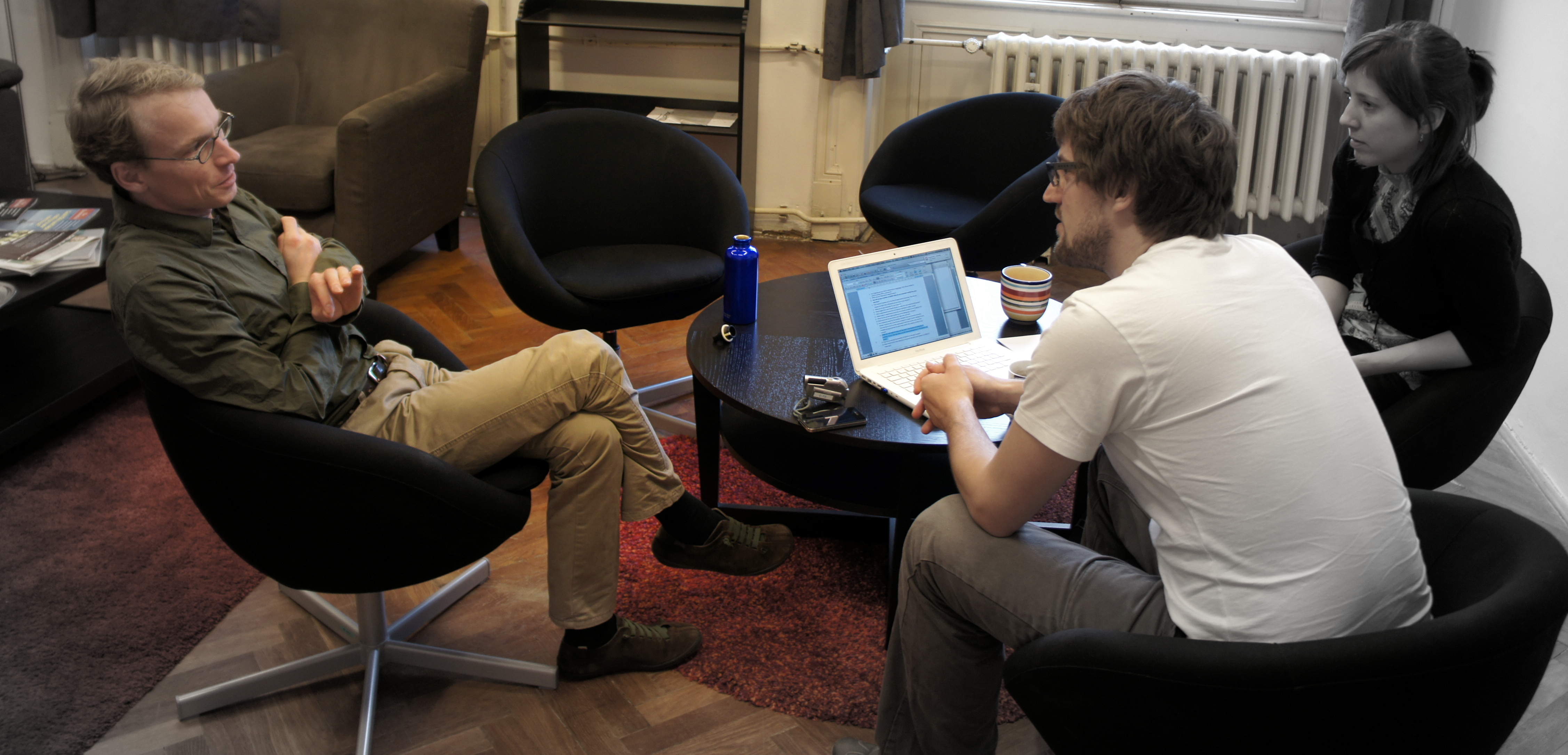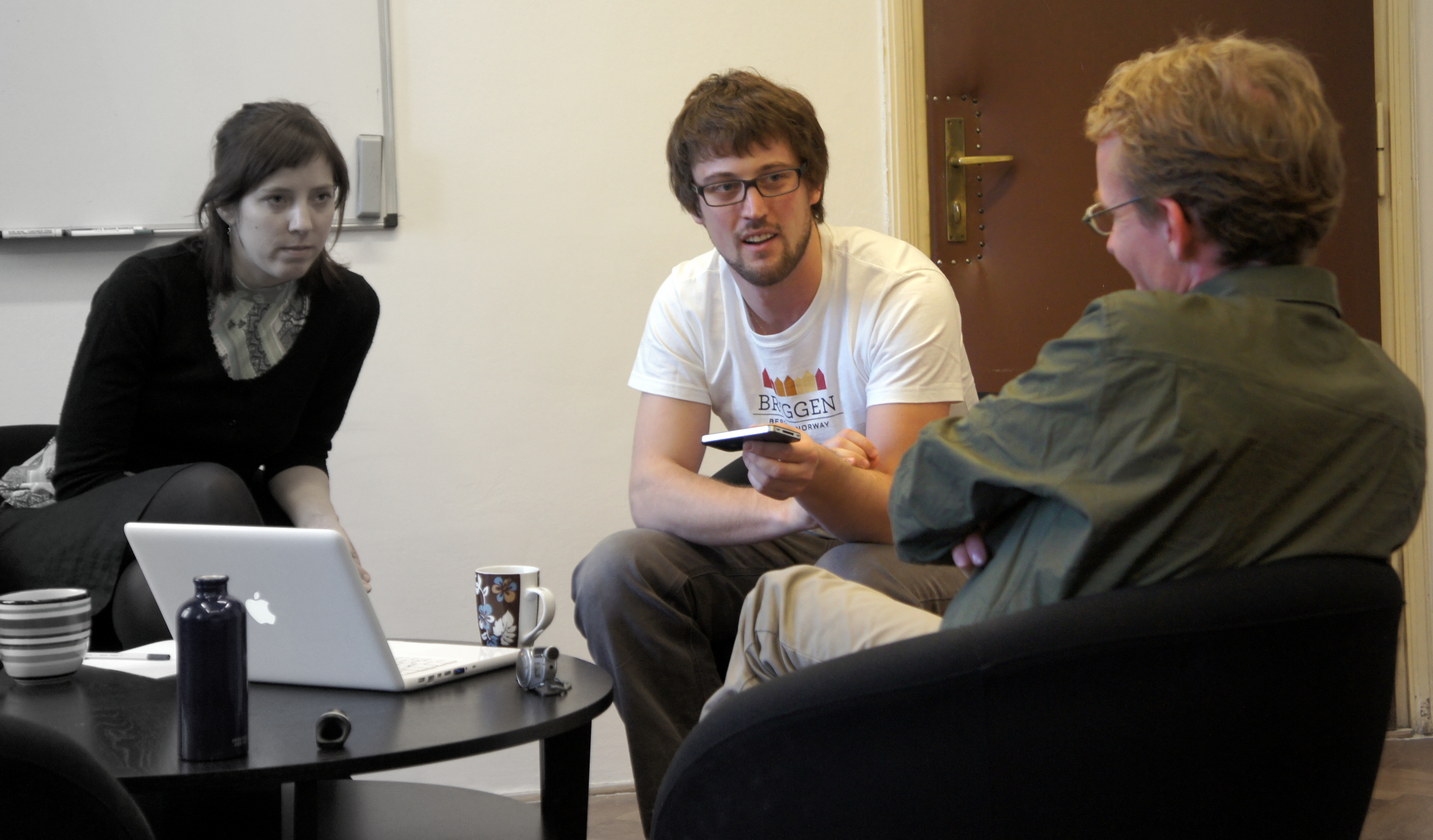During Professor Engelmann’s visit to CERGE-EI, he sat down to speak with two PhD students for a brief interview. They discussed the direction of experimental economics, tips for getting a paper published, and the inspiration for research. Have a look at their interesting discussion:
On your CV we saw that you originally did a Masters in mathematics. Why did you decide to switch to economics?
I wanted to do something with somewhat more direct meaning towards life. Math was nice, but quite empty in some ways. Originally I planned to do my PhD in psychology. But I realized that the economists were a bit more open to introducing psychological ideas into experiments than psychologists were open to, for example, game theoretical modeling. If you do research with both psychology and economics, it seems easier to do it within economics, at least if you want to do it a bit more formally.
How do you get inspiration for your research?
There are three ways. One, I see some kind of theoretical or empirical paper, and I think ‘that’s worth testing’. Two, I see other experiments where I don’t quite trust results, and I want to do robustness checks. As for the third thing: I like to talk to people who don’t do experiments, because they often have questions that they’d like to test experimentally. If you talk to people who don’t do experiments, you are usually exposed to unusual questions, and you have to think about relatively innovative experiment designs.
Can you tell us what you think are the economic topics today which provide for ‘low hanging fruits’?
I think it’s hard to find ‘low hanging fruits’, because there are so many people doing experiments now. It is very attractive to start doing experiments, because it is a bit more entertaining than theoretical or empirical stuff. You can avoid some of the problems there. And you can be sure to get some kind of results. So I think that everything that looks like low hanging fruit is being constantly picked by these armies of experimentalists. Of course there are always some obvious questions that are not explored.
So you say that the field is getting bigger and a lot of people are doing experiments. Where do you see the field progressing in the future, and what would you like to see?
There are probably two future developments. One, there will be more rigorousness in methodology. Sometimes experimental stuff is sloppy and provides weak empirical analysis. So I think there will be tougher standards on ‘replicability’ and so on. And the other thing is, hopefully there will be more relevant, more question-driven research. This is what I would hope. I see the same problem in all fields, and I think the problem is that we teach PhD students typically methods, but we don’t teach them how to ask questions. And we somehow believe that these are smart people and they are going to have good questions, and so we teach them the methods to solve them. But second year students, they need a topic. Essentially what happens is they learn good methodology but they often end up doing obvious things. They pick new data, they pick a slightly new question. They don’t have an original question. They know how to do the method, but they just pick the questions they think they can answer based on that.
So I think all parts of economics can use some more ‘question-driven’ research. And that’s one reason why new fields are often exciting; people start new methodologies because they have questions that they can’t solve with conventional methods. But then it normalizes. People start learning the stuff as the standard methodology, and they then stop looking for topics which would require new procedures.
Can you give us an example?
Well look at Alvin E. Roth. He is a Nobel Prize winner not for terribly innovative methods; he did pretty standard theory and experiments. But he applied them and he implemented them, and now he actively saves lives through a very simple exchange method for kidneys. Meanwhile, many academics pray to the people who produce very complicated stuff which we can’t apply.
You received an award from the American Economic Review for ‘Excellence in Refereeing’. So we think you would be the best one to tell us how to recognize if a paper is actually worth reading. And also, for our students who wish to have a paper published, what are the most common mistakes they should avoid?
Unfortunately, there is no recipe for how to write a great paper, but the most common mistake is to be too technical. For most general interest journals, you have to interest a general audience, and editors look for that. For top general interest journals, you might get a response which says ‘nice idea, but this is for a too narrow audience’. Researchers tend to concentrate in one area, and it’s then hard to step out of what you know and think about other people and what they find interesting. And you may have forgotten why it’s interesting yourself. So the key thing is to make it clear why the research is useful. You need to really know why you are doing it.
Another thing is to not try to say everything that you can possibly say. There are always many results, and you have to only pick some of them. But it’s amazing how much things are a matter of taste. Very often you get differing reports on the same paper from different journals.
So CERGE-EI basically started as an institution whose main domain was economics of transition. You yourself once were on faculty here. Do you think there are still lots of unanswered questions in the transition domain? What do you see as the direction of research at CERGE-EI in the future?
Well I don’t know that much about transition, but I guess we do see a lot of countries on a downward transition path where some interesting research can be done. The truth is, it would be a pity if CERGE-EI just became a ‘normal institute’ doing normal things, and let the transition stuff go.
How do you perceive the evolution of CERGE-EI in the last 20 years?
I didn’t experience the early history, but I know it was always interesting because CERGE-EI was itself a place in transition, and there were questions about the mission of CERGE-EI. In the beginning it was a bit clearer what that was, but a time came when things changed and it was complicated to find new routes. But the institute seems to be broadening now. Yet it’s important to teach transition, because it is a way for CERGE-EI to kind of specialize. There is a credible history here of being a place in transition in a transition environment, and we wouldn’t want to waste that.
Also read the blog post about Professor Engelmann’s lecture here
Interviewers: Vojta Bartos, Jana Cahlikova
Monday, 22 October 2012

